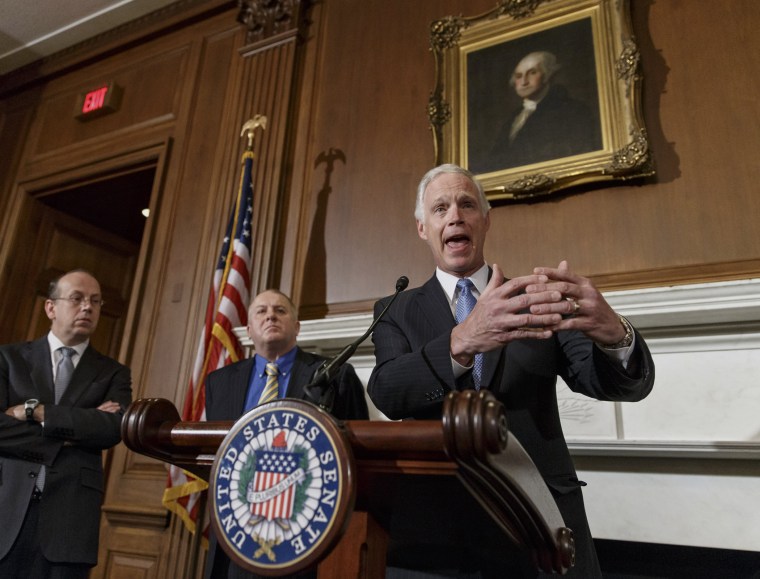Sen. Ron Johnson (R), running for re-election in Wisconsin, is one of Congress' more vulnerable Republican incumbents, and polls show him trailing the Democrat he defeated in 2010, former Sen. Russ Feingold (D). Johnson, however, is flush with cash, which he's eager to put to use.
And while not every campaign commercial deserves special attention and scrutiny, the Wisconsin senator's newest spot is amazing for an important reason. Roll Call reported:
Republican Ron Johnson is a first-term U.S. senator from Wisconsin. The voters back home wouldn't know it watching his re-election campaign's first TV ad. Even for a time when incumbent lawmakers try to distance themselves from their job titles, Johnson's new ad takes that approach to an extreme. It doesn't once mention his work as a lawmaker or even identify him as a senator.
That may sound like an exaggeration, but it's not. The Republican's re-election ad is carefully designed to give viewers the impression that he's not already a senator.
In the spot, Johnson makes literally no references to any work he's done while in office; he doesn't identify himself as a senator; he doesn't note any Senate achievements; and he doesn't mention that he's running for re-election.
Instead, the far-right Wisconsin lawmaker and committee chairman boasts in the ad, in the present tense, "I manufacture plastic," which is sort of true, except for the fact that he also currently helps shape federal laws from Capitol Hill.
He goes on to say, "I've stayed put, right here in Oshkosh, for 37 years." Left unmentioned: the last six years in which he's been a powerful Beltway insider.
It's tempting to assume that Johnson would take some pride in the work that's he's done as a senator, but the GOP lawmaker is instead going in a very different direction, apparently hoping that Wisconsin voters forget that they've already voted for him -- thereby allowing the Republican to pretend he's a businessman outsider.
And if this sounds vaguely familiar, it's because Johnson isn't the first to try to pull this trick.
Long-time readers may recall this piece from four years ago, featuring a variety of Republicans in Congress running re-election campaign ads that pretended they weren't in Congress at the time.
My personal favorite was this spot from Rep. Dan Benishek (R-Mich.), who didn't want voters to know he was a congressman, and who blasted his Democratic challenger who'd never served in Congress as a "career politician." (It worked; Benishek won re-election.)
The New York Times reported at the time on the larger phenomenon: "Bragging about one's voting record used to be a staple of political advertising, and a career in Congress was worn as a badge of honor. But this year, many House candidates are deciding not to mention their service here, a blunt acknowledgment of the dim view that a vast majority of voters have of Congress."
Not one of these incumbents, however, was a sitting U.S. senator. As best as I can tell, Ron Johnson is the first Senate incumbent in recent memory to run ads predicated on the assumption that his constituents don't know he's already in office.
Johnson appears confident he hasn't made much of an impression on Wisconsin voters over the last six years -- as if that were a good thing.
